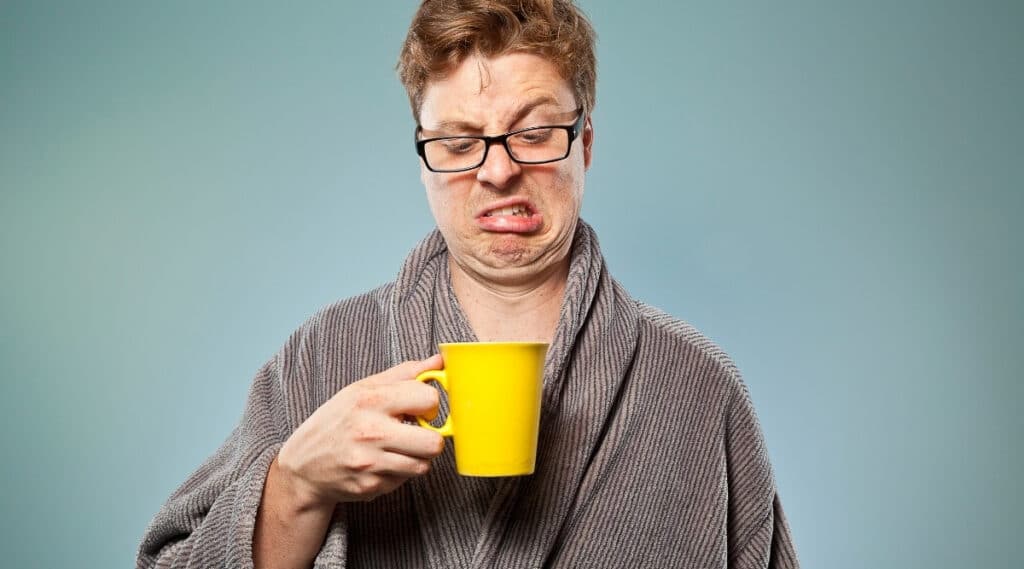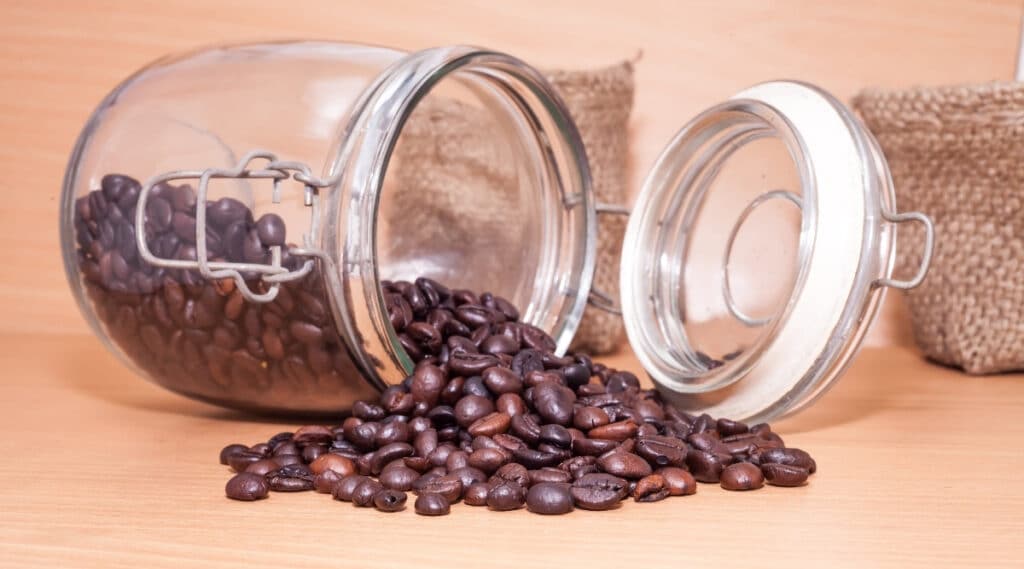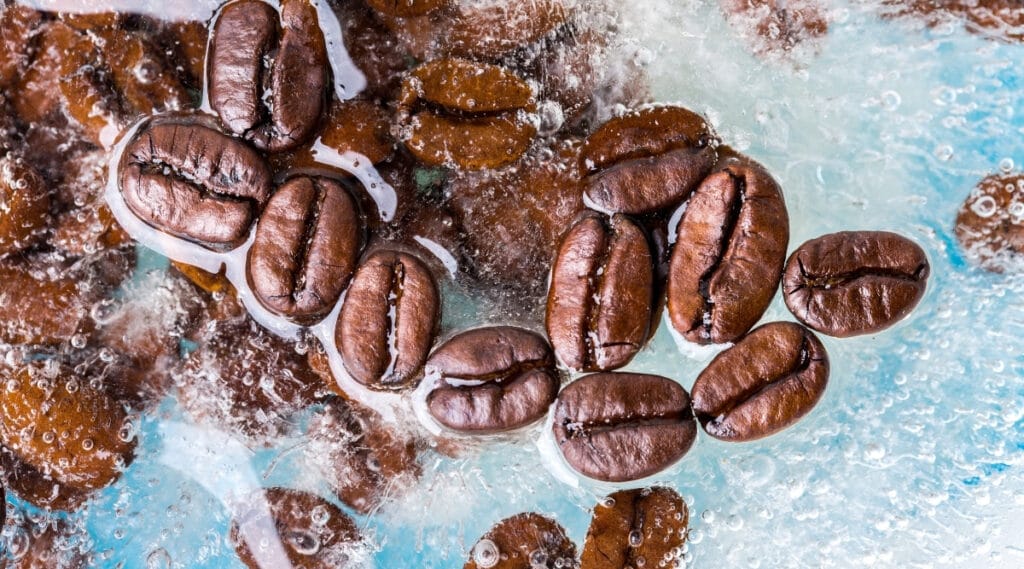Have you ever found a lost bag of coffee in the corner of the cupboard? You had bought it weeks – or even months – ago, and now you’re wondering how long do coffee beans last?When do they expire? How should you store them to keep them fresh? A better question may even be, does coffee ever go bad?
Coffee isn’t like other foods that noticeably expire. Bread grows mold, meats smell bad, and other foods change color. But coffee? When coffee does expire, it hardly changes. You may not even notice you’re drinking coffee that has passed its prime.
While coffee can last for years, that doesn’t mean the taste will stay the same. When it comes to coffee, it’s not a question of “going bad” but of freshness and quality. Let’s learn more about coffee freshness, how long it lasts, and how to store coffee properly.
Contents
Is My Coffee Fresh?
Many people think that buying whole coffee beans and then grinding what they need right before making a cup of coffee helps preserve the freshness. However, the best way to gauge coffee freshness is to check the roasting date.
Most coffee companies put the roasting date on the bag to see when the coffee reaches its peak. However, you don’t want to drink the coffee right after it was roasted, as it needs about three to five days to reach peak freshness.
During the roasting process, the high heat used causes carbon dioxide to form on the beans. It takes several days for that layer to disappear, so it’s best to wait until the process is complete. If you brew the coffee still with the carbon dioxide there, it will give your coffee a horrible taste.
For the highest quality of coffee, you’ll want to drink it within a week of peak freshness. However, everyone has a particular preference when it comes to coffee taste. Some enjoy the taste of the beans a week after roasting, while others prefer an aged flavor that comes after a few months. In either scenario you will need the best coffee roaster to roast your beans to perfection. Check out a few of our favorite home coffee roasters available on the market today by clicking here.
Has My Coffee Gone Bad?

Now, if you find old coffee in your cupboard and don’t want to throw it away, check to see if it is still good by doing a smell test. If you open the bag and can still get a strong whiff of that delicious coffee, it has not gone bad. Aroma is one of the key indicators of the freshness of coffee. Odds are if the coffee beans still have the dark, pungent smell of coffee that we all love so much, then the beans are still good!
If you check the taste without smelling it, you may notice a less potent flavor. However, our nose is much more useful than our taste buds, so trust the smell more than the taste.
If there is no smell when you open the bag, don’t risk drinking it. The absence of a rich coffee aroma could mean that the beans are not safe to consume.
Is It Safe to Drink?
What if you have coffee from years ago? Is it still safe to drink? The short answer is yes. However, there are some warning signs to take into consideration.
It can be hard to tell if coffee is expired or not, especially if there is no date on the bag. While other foods have a sharp smell or visually change due to bacteria growth, coffee usually remains unaffected.
Expired coffee doesn’t attract bacteria or insects for two main reasons. One, bacteria doesn’t feed on coffee, thanks to the lack of calories. Also, the high amount of caffeine in coffee is a natural insect repellent. Just like some coffee plants are immune to diseases because of the caffeine, the beans have that same protection.
While drinking old coffee won’t hurt you, you may note that the flavor is dull, or you don’t feel the same caffeine effects. Coffee can last for years without any problem. However, you ideally want to drink within the first couple of months at least to enjoy its most exquisite taste.
If you notice any abnormalities, like mold, a strong, unpleasant smell, or a bad taste, don’t consume the coffee. The beans aren’t entirely resistant to the natural process of deterioration, and mold can form on any moist surface.
Furthermore, the longer coffee sits, the more the fats disintegrate. If you drink coffee that has completely lost its smell, grown mold, or taken on a new odor, you could have a stomach ache or even food poisoning.
If a coffee tastes bitter, you may mistake the coffee beans as being rancid. Interestingly, the bitter taste is most likely not from the coffee beans being old or stale.
Typically, coffee will taste bitter due to the coffee being what is referred to as overly extracted. The most common cause of overly extracted coffee is from exposing coffee grounds to too much water for too long a period.
Bitter coffee may be a sign it is time to brush up on your brewing skills or may even be an indicator that your coffee maker is ready for a thorough clean. Bitter coffee does not, however, typically mean your coffee beans are old.
To avoid adverse effects, do the sniff test and check for mold. If it still smells like your favorite coffee and doesn’t have any growths, it is safe to drink. However, the preferred window for coffee consumption is a few weeks to months after roasting.
How to Store Coffee

Since coffee can be susceptible to things like mold, you want to make sure you store your coffee correctly. That way, you can be confident that the freshness remains for months.
Before we look at different ways of storing roasted coffee beans, let’s talk quickly about unroasted coffee. How long does it last?
The unroasted – or raw – beans last the longest. You can think of them like uncooked pasta. They could potentially not taste great after an extended time. However, you haven’t cooked them yet, so they can still sit in the pantry. Likewise, because raw beans are unroasted, they can last for up to five years.
Coffee beans are roasted in order to enhance the aroma and flavor of the beans. Coffee beans start out green, as they are roasted they turn the deep brown most associated with the color of coffee.
You have the option to buy coffee beans unroasted and roast them at home or you can opt to purchase the beans already roasted.
Of course, you want to roast the beans before reaching that five-year mark to take advantage of the full flavor potential, but there is no danger in storing green coffee for more extended periods. Think about how long it takes to harvest the different types of coffee beans and ship them to the store near you. Undoubtedly, the coffee spent some time in storage as raw beans, with no change to its final taste.
If you can roast the beans yourself, it is best to buy and store green coffee, so you do not compromise at all on the taste. However, most of us buy a bag of roasted coffee beans and use them periodically. So, what’s the best way to store coffee?
How Long Do Roasted Coffee Beans Last
We have already talked about how roasted coffee can last for years and how to see if you have bad beans. The following coffee shelf lives are estimates, so make sure you always test the quality of your coffee.
For long-lasting roasted coffee beans, you should store them in heat-sealable bags or opaque jars with air-tight lids. Clear storage containers will allow light to penetrate the beans, causing them to oxidize.
Choosing to store coffee beans in a dark, cool and dry location away from any sources of heat or moisture is the best way to ensure the freshness of your coffee beans.
It is important to ensure that the coffee beans are away from a heat source as heat can affect the oils in roasted coffee beans which can cause the flavor of the beans to spoil more quickly. In jars away from sunlight, coffee can last up to 18 months, while the bags give it a shelf life of one year.
If you don’t know what kind of bag your coffee is in, check for a vent valve. This outlet allows the coffee breath as it releases the carbon dioxide present immediately after roasting. The presence of this valve shows that it is in a heat-sealable bag and will last for 12 months.
If you store your roasted beans in regular boxes or jars, they will only be good for about two weeks. However, using sealed, layered paper bags, especially with a polymer coating, will give you up to nine months.
How Long Do Vacuum-Packed Roasted Coffee Beans Last?
Many companies prefer to vacuum-pack their whole and ground coffee for an even longer shelf life. If you buy a vacuum-packed bag of whole beans, that means they replaced the air with an inactive gas. For pre-ground coffee, a vacuum seal means that they took the air out without inserting any other kind of gas.
The absence of air stops the oxidation that occurs after roasting and keeps the beans as fresh as possible. Like the heat-sealable bags, the vacuum-packed bags will have a vent valve to let out any carbon dioxide that leaves the beans.
If you don’t open these bags, they have the most extended shelf life of 18 months. However, once opened, you want to drink the coffee as soon as possible.
Freezing Coffee Beans

Did you know coffee beans can be frozen and stored for future use? Freezing coffee beans is a great option for extending the shelf life of the coffee beans while still maintaining the original aroma and flavor of the beans.
Being that each batch of coffee beans are unique, we recommend you select a small sample of beans to perform a test freeze, defrost and brew with to ensure the integrity of the bean’s taste is retained to your liking.
To freeze, you can either opt to freeze the unopened bag that contains the coffee beans by putting it directly into the freezer. If the bag has been opened, we recommend you transfer the coffee beans into a freezer bag or other airtight container before placing in the freezer.
Many recommend organizing the coffee beans you are planning on freezing into smaller portions, so you have the amount of coffee beans you will want on hand ready to grab and brew.
Before brewing with frozen beans, you will want to remove them from the freezer and defrost at room temperature.
Cozy’s Bottom Line
There is no set answer to the question of how long do coffee beans last. Their shelf life depends on a variety of factors, including storage and your personal taste preference. Most coffee fanatics will insist on drinking the coffee within two weeks of peak freshness. Nonetheless, if there are no bad smells or mold, many people still enjoy a cup of coffee from months or years ago.
If you are at all concerned about the quality of your coffee, don’t drink it. It’s better to buy a new bag of coffee than potentially risk your health. Cozy always recommends that when in doubt, throw it out!
However, do make sure you store your coffee correctly. If you buy several bags at one time, don’t open them all at once. Leave your coffee in the nice heat-sealable or vacuum-packed packages they came in and only open them when you are ready to drink them.
Coffee isn’t like other foods, and it can outlast most of the things in your refrigerator and pantry. Just make sure you check the beans for smells and mold before consuming, and you will be fine. If you want to ensure the best taste, though, drink the coffee within two weeks of the roast date.
Frequently Asked Questions
Q: How do you know if coffee beans are bad?
A: Smell is one of the key indicators of coffee gone bad. If the aroma of the coffee is no longer there when you sniff it, then most likely the coffee is expired. Coffee beans may also lose their dark brown color and appear lighter if expired as well.
Q: Is it ok to use expired coffee beans?
A: Generally it is safe to use expired coffee beans as long as they do not have any evidence of mold. Typically the most noticeable element of stale coffee beans will be a lack of smell and taste.
Q: Should you refrigerate whole coffee beans?
A: No, it is actually recommended that you store whole coffee beans in a dark location at room temperature in an opaque, air-tight container.
Q: How long do coffee beans last in the fridge?
A: Coffee beans can last in the fridge for up to a month when sealed in an airtight container.
Q: How long do coffee beans last in the freezer?
A: Coffee beans will maintain optimal freshness in the freezer for 3 to 4 months, but will remain safe to brew beyond that time.
Q: How long can you store green coffee beans?
A: Green coffee beans can be stored for up to twelve months without losing their smell or taste. It is recommended you store green coffee beans in a cool, dark place.
Q: Do coffee beans lose caffeine over time?
A: Yes, coffee beans do lose caffeine over time.
Q: How long do coffee beans last in the bag once opened?
A: For maximum freshness, it is recommended you use coffee beans within two weeks of opening the original packaging. To extend the shelf life of your coffee it is recommended to store coffee beans in a sealed, airtight container.
Q: How long do coffee beans last once ground?
A: Coffee beans are a shelf-stable good, meaning it takes years for the beans to go stale. Ground coffee beans do lose their freshness 7-10 days after roasting.
Q: What is the best coffee grinder for home use?
A: There are many home coffee grinders available on the market today. Take a look at our review of the best coffee grinders by clicking here.
Conclusion
The key to brewing a delicious cup of coffee is all about the coffee beans. Whether you decide to buy your coffee beans whole or ground, we hope this guide helps you to store your coffee beans so you are able to brew the freshest cup possible. Happy Coffee Drinking!
